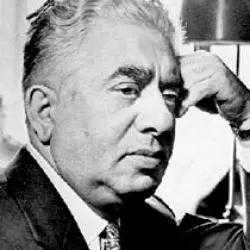
Aram Khatchaturian
Soviet-Armenian Classical Composer and Conductor
Aram Chačaturjan byl významný sovětský arménský skladatel a dirigent, který se proslavil svým přínosem klasické hudbě 20. století. Chačaturjan se narodil 6. června 1903 v gruzínském Tbilisi, které bylo tehdy součástí Ruského impéria, a stal se jedním z předních sovětských skladatelů vedle Dmitrije Šostakoviče a Sergeje Prokofjeva. Jeho hudba se vyznačuje pestrými harmoniemi, bohatou texturou a často obsahuje prvky arménské lidové hudby.
Aram Chačaturjan byl významný sovětský arménský skladatel a dirigent, který se proslavil svým přínosem klasické hudbě 20. století. Chačaturjan se narodil 6. června 1903 v gruzínském Tbilisi, které bylo tehdy součástí Ruského impéria, a stal se jedním z předních sovětských skladatelů vedle Dmitrije Šostakoviče a Sergeje Prokofjeva. Jeho hudba se vyznačuje pestrými harmoniemi, bohatou texturou a často obsahuje prvky arménské lidové hudby.
-
Kategorie:
- Klasická hudba
- Modernismus
- Československé klasiky
- Romantika

